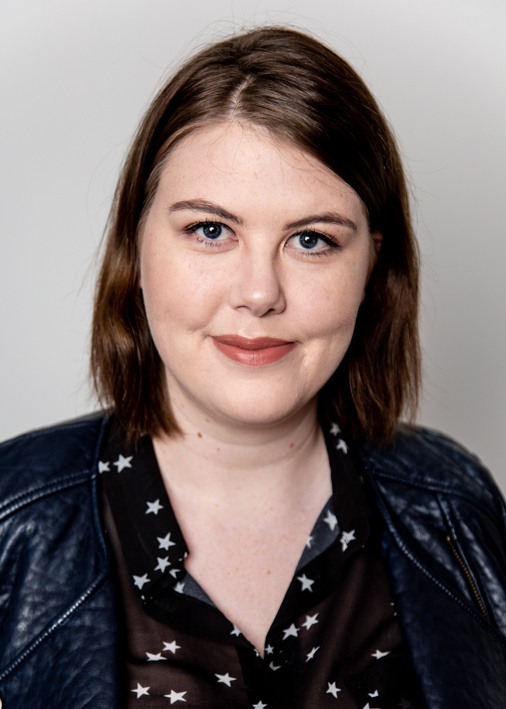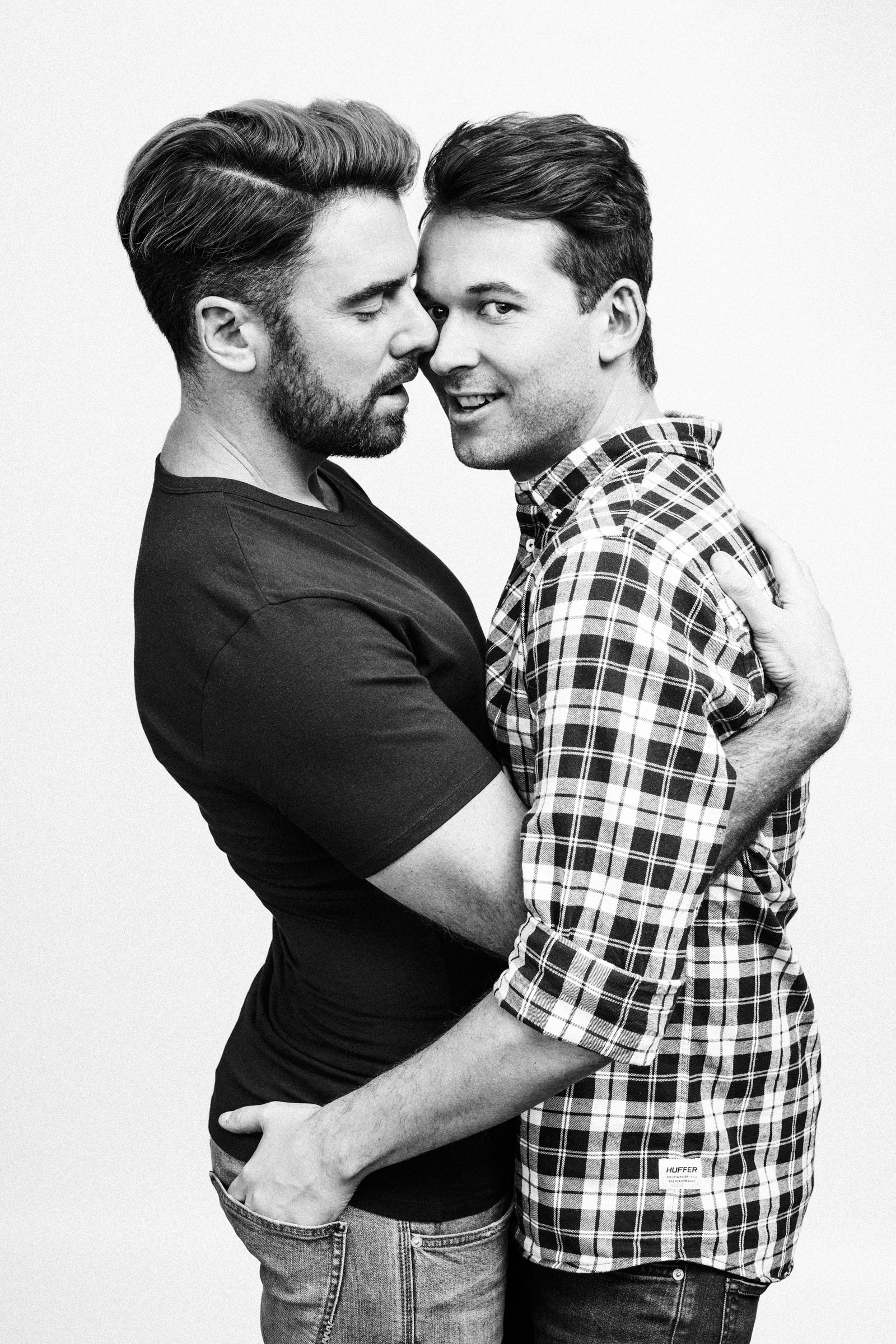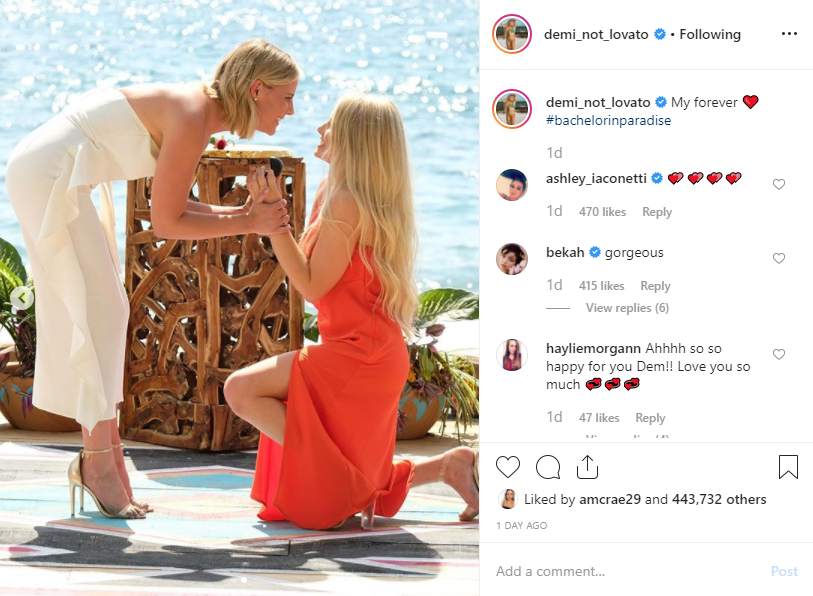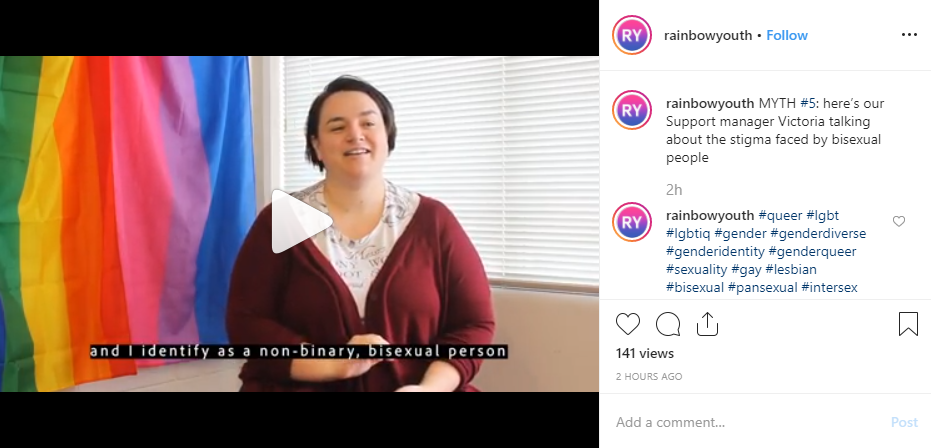This story was first published on September 24, 2019. It was republished on September 23. 2022.
Rachel Fawcett repressed her bisexuality for 15 years. She is sick of feeling like a vacationer within the LGBTQIA+ community, viewed as a toy to play with and discard by straight men and women.
Here she discusses bi-phobia and how some very worrying mental health statistics are going to become bloody loud and harder to ignore.
For those of us who identify as ‘B’, it’s painfully obvious that our letter may as well be silent.
Bisexuals (people who are attracted to multiple genders) make up over 50 per cent of the queer population, yet are the least visible. Bi-erasure and bi-phobia are constantly pushing the bisexual population into the closet, and for those of us who are out, it’s a frustrating uphill battle for our sexuality to be seen as valid.
For me, the seemingly endless journey of coming out has been plagued with internalised bi-phobia, and witnessing negative stereotyping from sexual and romantic partners, colleagues, casual acquaintances and family.
Here’s some alarming research: Almost half of bisexual men, and over half of bisexual women have been victims of rape at least once in their lifetime.
Sadly, that’s not actually alarming to me.
An Auckland PHD candidate discovered the findings, published in the Journal of Bisexuality, before herself surveying 1,000 bisexual women in New Zealand.
Research suggests that “almost three quarters of bisexual women have experienced sexual violence in some form,” Tara Pond told me.
But what’s the correlation between sexual violence and bisexuality? Pond notes theories that identify “the systemic prejudice and erasure of bisexuality, coupled with the sexualisation and objectification of bisexual women” as one of the factors.

Tara Pond (photo: Ann Orman)
Ask any bi woman about sexualisation, and you’ll be confronted with an archive of creepiness.
Kaarina (26), who identifies as bisexual, recalls a particularly bad date who was almost laughably textbook in his response.
“Eventually he just leaned over and said ‘I think bisexual girls are really hot, like that just makes me even more attracted to you.’ It made me feel gross, and super uncomfortable. Firstly, my sexual identity doesn't exist for your personal gratification buddy. Secondly, let's talk about tokenisation. I ended up ghosting him.”
In Dave Chappelle’s latest Netflix special, Sticks and Stones, none of the letters in LGBTQ initialism were safe from ridicule. But after sitting through a few minutes of his lazy brand of damaging “comedy,” one thing in particular struck me like huge bi-phobic hammer to the head. “If there’s one thing that the L’s and the G’s agree on, is that the B’s are fuckin’ gross. ‘Cause they’re just sittin’ in the back seat like, “Yeah, man, I’ll fuck anybody in this car,’” Chapelle says.
According to Pond, these stereotypes of being ‘inherently promiscuous, non-monogamous, and likely to cheat on their partners’ are more rampant than ever. It should come as no surprise then, that bisexual women frequently become targets for couples who are looking for a third party on dating apps. The practice has even coined its own label: unicorn hunting.
“Bisexual women only being seen as an extra for a threesome is extremely demeaning but is a very frequent experience that contributes to the sexualisation of bisexual people,” says Pond.
Beyond the relentless sexualisation and fetishisation of bisexual people, are the exhausting assumptions of having “chosen a side”. While Kaarina acknowledges her primarily queer-friendly social circle made coming out a positive experience, ignorant comments still fought their way through. “Probably the most common is the ‘oh, you’re dating a woman now, so you’re a lesbian?’ or vice versa.”
It’s these assumptions that made me beyond fearful of coming out. Having a dating history made up entirely of cis gender men, I’ve been mislabelled as straight more times than I can count.
Feeling like I needed to prove my queerness created a constant undercurrent of anxiety, and perhaps also led me to overshare about my liaisons with women. In the end, any serious discussion about my dating future always resulted in comments like, “but you’ll probably marry a guy, right?” It didn’t matter that I’m attracted to men and women. My dating past meant I’d chosen a side.
Bisexuality may seem like it’s having a big moment in pop culture right now, with Bachelor In Paradise making history with its first same-sex proposal, and NFL free agent, Ryan Russell, coming out in a beautiful essay that challenges the NFL’s hyper-masculine, aggressively-heterosexual image.
Unfortunately, the reality of bisexuality paints a picture void of vibrant rainbow hues.
It took seven seasons for Orange Is The New Black to describe its lead, Piper (Taylor Schilling), as bisexual, after years of mislabelling and mishandling her an “ex-lesbian” or “straight”, demonstrating how little respect ‘B’ has in the LGBTQ initialism.
The fact that bisexuality is still seen as, to quote one truly awful episode of Sex and the City, “a layover to Gaytown” and “greedy double dipping,” makes coming out as bisexual all the more difficult.
Jack (27) knows all too well how people in the queer community can completely disregard the validity of bisexuality.

Jack will soon appear in a Wellington play, Cock, where he plays a bisexual man. (Photo: Tabitha Arthur Photography)
“I only ever heard it talked about as like a stepping stone to being gay or in a joking and dismissive way, as if it wasn’t a legitimate thing,” he says.
Victoria Tow, a support manager for Rainbow Youth, identifies as bisexual and non-binary. Trow says stereotypes like these are a huge barrier for bisexual people being able to live openly. “Bisexual guys are often seen as actually secretly gay, and bisexual women are often seen as just straight girls looking for ‘attention.’ It’s hard enough coming out, more so when no one believes you!”
Jack’s experiences with some gay men, he explains, is riddled with classic nudge-nudge wink-wink responses. “They sort of knowingly say something like ‘oh yeah I used to be bisexual too.’ Even when it comes as just a sassy remark or joke that is not meant with any malice at all, it just sort of reduces and delegitimises my experience and identity,” Jack says.
Disappointing as it may be, assuming bisexuals are just secretly gay or potential PornHub fantasies come to life is just the tip of the iceberg.
In addition to an increased risk of being victim to sexual violence, research suggests that bisexuals also face poorer sexual and mental health. The Australian Journal of General Practice highlighted distressing findings from the Who Am I study, which surveyed over 2,600 bisexual adults on mental health issues. Bisexual participants in the survey were found to be more likely to have suicidal thoughts (77.6% compared with 13.3% of the general Australian population).
According to the The Australian Journal of General Practice, “bisexual people have been found to experience a greater lack of self-acceptance with regards to their sexuality than homosexual people.”
When society has only negative stereotypes of bisexuals at the ready, the idea of bisexual youths finding peace at home and within themselves can seem discouraging. As Trow explains, “Parents might be prepared for a child to come out as lesbian or gay, but are at a loss if their child comes out as bisexual - they will likely only have harmful ideas to build their understanding on. For reasons like this, young bisexual people aren’t likely to come out at home.”
With so many barriers and misunderstandings surrounding bisexuality, it’s no wonder internalised bi-phobia runs rampant.
So how do we avoid these pitfalls? According to Trow, a simple start is talking about it more and busting myths. For whanau in particular, Trow advises trying “not to assume that if your young person is dating or interested in the same gender or a different gender, that they are only going to be attracted to that gender. This could be something as small as asking them about a new partner rather than a new girlfriend or boyfriend.”
For Pond, progress would mean an upheaval in how society seems to lean towards both gender and sexual binaries. “Bisexuality disrupts this binary and reflects fluid and diverse ways of experiencing sexual identity. I hope that more discussion of fluid sexuality, and representation of this in the media that normalises bisexuality, can combat this.”
I often find myself wondering how my journey might have been different had Sex and the City talked about bisexuality in a more legitimate and respectful way. Would I have avoided the weight, shame and guilt of compartmentalising and repressing my sexuality for almost 15 years? Perhaps, more critically, would I have owned my bisexuality when it could have really meant something to someone else who was struggling? I hope it’s not too late.
Every single bisexual person deserves to live an authentic life. Out and proud. Free of judgement, with room for self-acceptance to foster and grow. So are we going to continue making it hard for them? Or will you let the Bs just be?
More stories:
A practical guide on how to get a good job reference
Give your flatmate a break.
Face value: The petition to remove the Monarchy from our money
"We've got a couple of years now to figure out what symbols represent us as a country.”
Uh oh: Repeated infections may make you 50% higher risk for Alzheimer's
A new study has found concerning links between viral infections and the disease.

